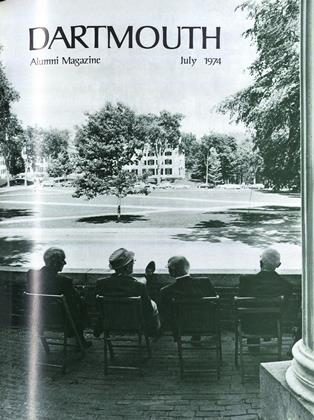By Joseph W. Bishop Jr.'36. New York: Charterhouse, 1974. 317 pp.$8.95.
Soldiers, observed Sir William Blackstone, the noted English jurist, occupy "a state of servitude in the midst of a nation of freemen." Though Blackstone was referring to 18th-century England, his statement is equally applicable to 20th-century America, for in military law a man in uniform is virtually deprived of the safeguards afforded all other Americans by the Bill of Rights As a matter of fact, a soldier has very few rights under the Constitution.
"Nothing about military life has ever been popular among Americans," Professor Bishop notes, and the system of justice by which military discipline is enforced is no exception. In the popular view, the court-martial system is harsh, arbitrary, and inconsistent administered by an arrogant officer class to terrorize and repress the common soldier in order to perpetuate its authority and control.
The great virtue of Justice Under Fire is that it explains the rationale of the system and the way it works. After sketching briefly and in broad strokes the historical background Bishop discusses the basis for a separate system of justice for the military administered by military courts. The chief reason is the necessity for maintaining military discipline, without which an army may present an even greater threat to its own nation than any enemy. And it is this need to maintain discipline, says Bishop that gives to the military commander who alone is responsible for the discipline of his troops the unique authority that distinguishes the military from the civilian legal system. In civil law no individual is comparable to the military commander. Not only does he convene the court but also he decides which cases should be prosecuted and who shall sit on the "jury" that will decide the case and assess the punishment.
Having established the background and basis for the military system of justice, Bishop describes in detail the way the court-martial system works. Unlike many of its critics, he finds much in the system that is meritorious and even superior to civilian practice. But the court-martial system is only one aspect of military law; Bishop is interested in all areas where the military impinges on law and the legal system Thus, he discusses various constitutional and procedural problems related to the legal status of the armed forces: the war powers of Congress and the President, the role of the Commander-in-Chief, the role of the courts, the jurisdiction of military courts, martial law, the applicability of the Bill of Rights, the use of troops in domestic conflict, and, finally, the international law of war.
As Richard Ely Professor of Law at Yale and a specialist in military law with wide legal experiences in government (including service in the Office of the Army's General Counsel and the U.S. High Commissioner for Occupied Germany), Bishop is exceptionally well qualified in a field in which there are few civilian specialists and a limited literature to draw upon. He also has a flair for words. He writes easily and well, spicing his narrative with anecdotes and a humor that is often biting and sharp, especially when it is directed against such targets as the "judicial proletariat" and the ACLU. More important, he has the ability to explain complex legal issues and difficult court decisions in simple and clear language easily understood by the layman. This happy combination of expertise and style results in an authoritative and highly readable study of military law that does much to correct many of the popular misconceptions of "justice under fire."
Chairman, Department of History, Dartmouth.College, and Daniel Webster Professor, Morton teaches American Military History andPolicy to 1900, American History After World War II, and War and Peace in the Twentieth Century.
 View Full Issue
View Full Issue
More From This Issue
-
 Feature
FeatureHonorary Degrees
July 1974 By M.B.R. -
 Feature
FeatureTruckin' from the Meat Bar
July 1974 By JOHN GANTZ -
 Feature
FeatureThe Valedictories
July 1974 By LAN R. LAW '74, John G. Kemeny -
 Feature
FeatureA Shapely Punctuation Mark
July 1974 By JAMES L. FARLEY '42 -
 Feature
FeatureUndergraduate Journal III
July 1974 -
 Article
ArticleBig Green Teams
July 1974 By JACK DEGANGE
LOUIS MORTON
-
 Feature
FeatureWAR AND HISTORY
FEBRUARY 1963 By LOUIS MORTON -
 Books
BooksTHE GETTYSBURG CAMPAIGN, A STUDY IN COMMAND.
DECEMBER 1968 By LOUIS MORTON -
 Books
BooksMILITARISM, U.S.A.
OCTOBER 1970 By Louis Morton -
 Books
BooksTHE AMERICAN CAMPAIGNS OF ROCHAMBEAU'S ARMY 1780, 1781, 1782, 1783. Vol. 1. THE JOURNALS OF CLERMONT-CREVECOEUR, VERGER, AND BERTHIER. Vol. 2. ITINERARIES AND MAPS AND VIEWS.
MARCH 1973 By Louis Morton -
 Books
BooksTHE WAGES OF WAR 1816-1965: A STATISTICAL HANDBOOK.
MARCH 1973 By Louis Morton
Books
-
 Books
Booksshelflife
May/June 2011 -
 Books
BooksTHE HOUR OF GIVING.
OCTOBER 1965 By ADDISON L. WINSHIP II '42 -
 Books
BooksLEG MAN
April 1943 By Herbert F. West '22 -
 Books
BooksTHE BLACK LILY
July 1951 By Herbert F. West '22 -
 Books
BooksStories With Purpose
SEPTEMBER | OCTOBER 2020 By JOSEPH BABCOCK '08 -
 Books
Books"A HAMLET BIBLIOGRAPHY AND REFERENCE GUIDE
October 1936 By W. B. Drayton Henderson

